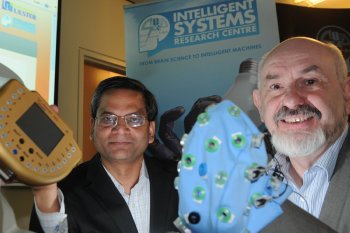
An international conference at the University of Ulster’s Magee campus has shed new light on pioneering scientific research that will give disabled people a better quality of life.
Magee is home to the University’s flagship Intelligent Systems Research Centre, where more than 100 academics and senior researchers from 15 nations are developing initiatives in computational intelligence, cognitive robotics, neural engineering and other ground-breaking blue sky scientific disciplines.
The conference trained a fresh focus on international advances that are harnessing robotic science and the computer-aided power of brainwaves in ways that will improve healthcare and independence for people who are disabled.
The International IKIERI Workshop on the Fusion of Brian-Computer Interface (BCI) and Assistive Robotics (AR) http://isrc.ulster.ac.uk/ukieri2011/ drew some 60 researchers, manufacturers, rehabilitation experts and care personnel from across the globe.
They explored the latest developments in brain-computer interface (BCI) technology and assistive robotics (AR). Their ongoing goal is to map out ways of integrating and moulding the two disciplines so as to improve the lives of people with severe physical disabilities.
ISRC Director Professor Martin McGinnity says that while tremendous advances have been made by researchers in both BCI and robotics technologies, there could be even greater potential if the two areas of research could be better integrated.
“The conference examined some of the barriers currently impeding the integration of BCI and robotics technologies. If we can overcome these, it could be hugely significant for helping severely disabled people cope with their disabilities.”
Professor McGinnity explained: “A brain computer interface, primarily, uses brainwaves modulated through voluntary cognitive tasks.
“These modulations can be used to establish a direct communication link between the human brain and computing devices in ways that may help people with neurological problems such as stroke.
“However, despite the potential for making life easier for people with physical disabilities, due to practical limitations there is still very little take-up of BCI systems for real-world use.
“Similarly in the AR field, highly promising prototype systems have shown that these can have enormous benefits in terms of helping disabled individuals in mobility, performing activities of daily living and undertaking rehabilitation exercises for recovery of paralysed limbs.
“These systems include a range of devices involving smart wheelchair, tele-robotics, intelligent manipulators, and prosthetic and orthotic devices. But AR systems have yet to find widespread application.”
Conference chairman Dr Girijesh Prasad, who is a Reader at the Intelligent Systems Research Centre, said it provided an ideal opportunity to brainstorm new ideas for turning BCI and AR research into readily available and usable technologies that could make real differences in the lives of disabled individuals, for example leading to greater independence and enhanced recovery of the paralysed limbs.
Brain Vision UK Ltd, a distribution company based in London, and manufacturer Brain Products GmbH, a German-headquartered firm that is making the next generation of BCI systems, jointly sponsored the conference. Brain Vision’s managing director, Mary Tighe, who is originally from Ballaghadarreen, Co Roscommon, said: “The conference has been an ideal platform for exploring recent advances in Brain Computer Interfaces and Assistive Robotic research developments that have the potential to bring great benefit to both disabled and able-bodied people.”
Caption
Professor Martin McGinnity, Director of the Intelligent Systems Research Centre and Dr Girijesh Prasad, Reader at the ISRC, examine some latest product technology at the Magee Campus conference on Brain-Computer Interfacing and Assistive Robotics.

















